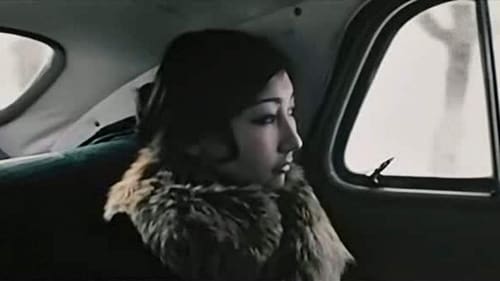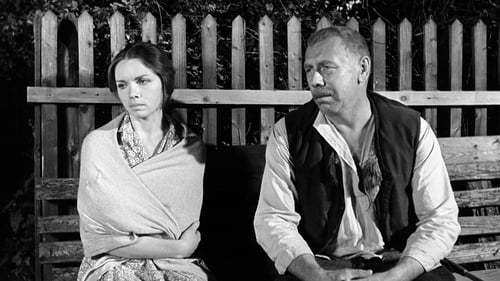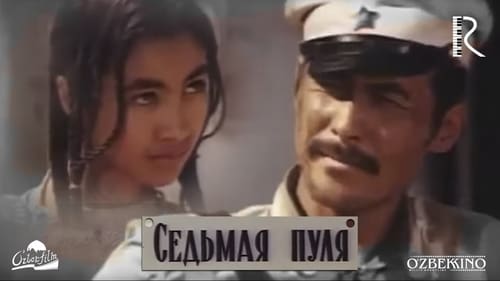Dilorom Kambarova
出生 : 1957-04-27, Margilan, Uzbek SSR, USSR

In this heavyhanded political allegory, set in the plains and mountains of Central Asia, a tribe of people led by the fanatical Mavrut (Vladimir Msrian) wanders about in the most desolate parts of this already desolate region in search of a mythical "Land of Happiness." Their quest is hampered by the fact that they must all live a life which is extremely ascetic. One tribeswoman expresses a desire to have a child, but is rebuked by being reminded that she has vowed never to have worldly ties that would distract her from the quest. When she has a child anyway, she and her lover are made to pay for this crime in a horrific way. Despite that, the child becomes a kind of holy mascot for the group, touted by the leader as a kind of savior. They are distressed when the child goes missing one day, only to appear mysteriously on the opposite side of the rapids of a river, beckoning to them.

Сколопендра, злая колдунья

Tioti
Police commissioner is fighting a criminal group leaded by mysterious Madame Vong while looking for a treasure hidden by pirates hundreds of years ago.

Dilya
A romance by Ali Khamraev with musical numbers interspersed

Fifth-graders Ulugbeg and Mirvali academic success did not differ. And when the teacher asked Ulugbek to give the letter to his father, the boy thought it best not to carry out this assignment. He also helped the first-grader Umida to correct one for four in her diary. However, thinking about their actions, Ulugbek and Mirvali change their attitude to study and decide to re-educate lazy Umida.

Милица Фёдоровна (молодая)
In the middle of the 17th century, a Cossack named Almaz Bitiy saves an alien from a certain death. In gratitude, he gives the Earthman an elixir of youth.

Khalima
This intriguing mixture of melodrama and politics is not divided into three parts; the title instead refers to three female characters whose lives intersect in a small town in northern Uzbekistan during the difficult days following World War II. The first is an old woman trapped in a forced marriage; the second is a schoolteacher imposing progress on the remote region; the third, and most important, is Khalima (Kambarova), an illiterate but determined young woman who resolves to build her own house without either her husband's or the state's approval. The film's harsh vision of life in postwar Uzbekistan, as well as its ambivalent attitude toward the conflicting demands of individualism and collectivism, made it the object of official disapproval.

Maa Islander
A Soviet cargo ship carrying medical opium gets attacked by pirates of an unknown nationality. The crew is left to die on a sinking ship but they manage to escape and now must fight the pirates for survival.

Lilyah
1876. The Turks murder the parents of the 14-year-old Rali. His only relative is sentenced to life imprisonment in the Asian fortress. Rali walks after the condemned men. After a long and painful road, he reaches the fortress. He finds help from the old man and his daughter. With their assistance, he organizes the escape of the condemned. After numerous adventures the fugitives reaches the motherland. They enlist in a Bulgarian rebel army together with the Russian soldiers of the Russian-Turkish War for the freedom of Bulgaria.

The film is based on the play of the same name by the national poet of Bashkortostan Mustai Karim. The events of the film take place in the XVII century. Drama from the history of the Bashkir people.

Farida
The third part of Tajik trilogy.

Amandyra
Man Follows Birds is a coming-of-age story of a young Uzbek poet surrounded by violence. Farouk is fascinated by trees and Khamraev films him with a lot of melancholy and tenderness. Cast apart because he’s poor and his father’s drunk, Farouk is not happy in his village. When his father dies, he decides to go in the mountains with his best friends. Looking for nature at its purest, the two teenage boys have to deal with the cruelty of violent barbarians. Their trip will also make them meet a lost orphan girl and a wise beggar.

Girl
Having lived for his pleasure most of his life, floor polisher Ivan Karetnikov, on the threshold of his 60th birthday, did not for the first time leave his next wife himself, but she abandoned him, moreover, in public. In addition to these troubles, he was fired from his job, replaced by a mechanical polisher. In this difficult moment, Karetnikov remembered the first wife, and then the second and third.
But turning to each of them, he seems to begin to lose hope of seeing compassion for himself.

Despite the restoration of Soviet power in the area, Basmachis continue to arrive from across the border, bringing death and destruction to peaceful villages. One of the bands of rebels is led by Khairulla who is pitted against the militsiya (local militia) leader Maxumov. At first it seems hopeless for Maxumov as the rebels capture most of his men, winning them over to his side. He has only one strategy left; to give himself up, and try to explain to the people that Khairulla has deceived them, turning the soldiers back to revolution. Later in pursuit of his enemy, he chases Khairulla across a river. He has only one bullet left -- the seventh, and he must not miss his target!

Movie almanac of two short stories: "Fan", "Spoiled holiday".

A Bolshevik army officer and Uzbek who has been nursed back to health by a young Uzbek woman to whom he is now married, gains responsibility for the local village in 1929. He is urged by comrades in Tashkent to have the local women drop their chadors and veils but he is also told that he should not force this on anyone. His wife declines to take off her veil, so a 14 year old girl steps forward to set the example, over the objections of the local Muslim clergy and most of the village men. After the girl is killed, and the commissar is shot, his wife takes him to the hills to nurse him back to health once again. She begs her husband to leave the village. Instead when he decides to return, she is pressured by her father to continue to wear the veil.











